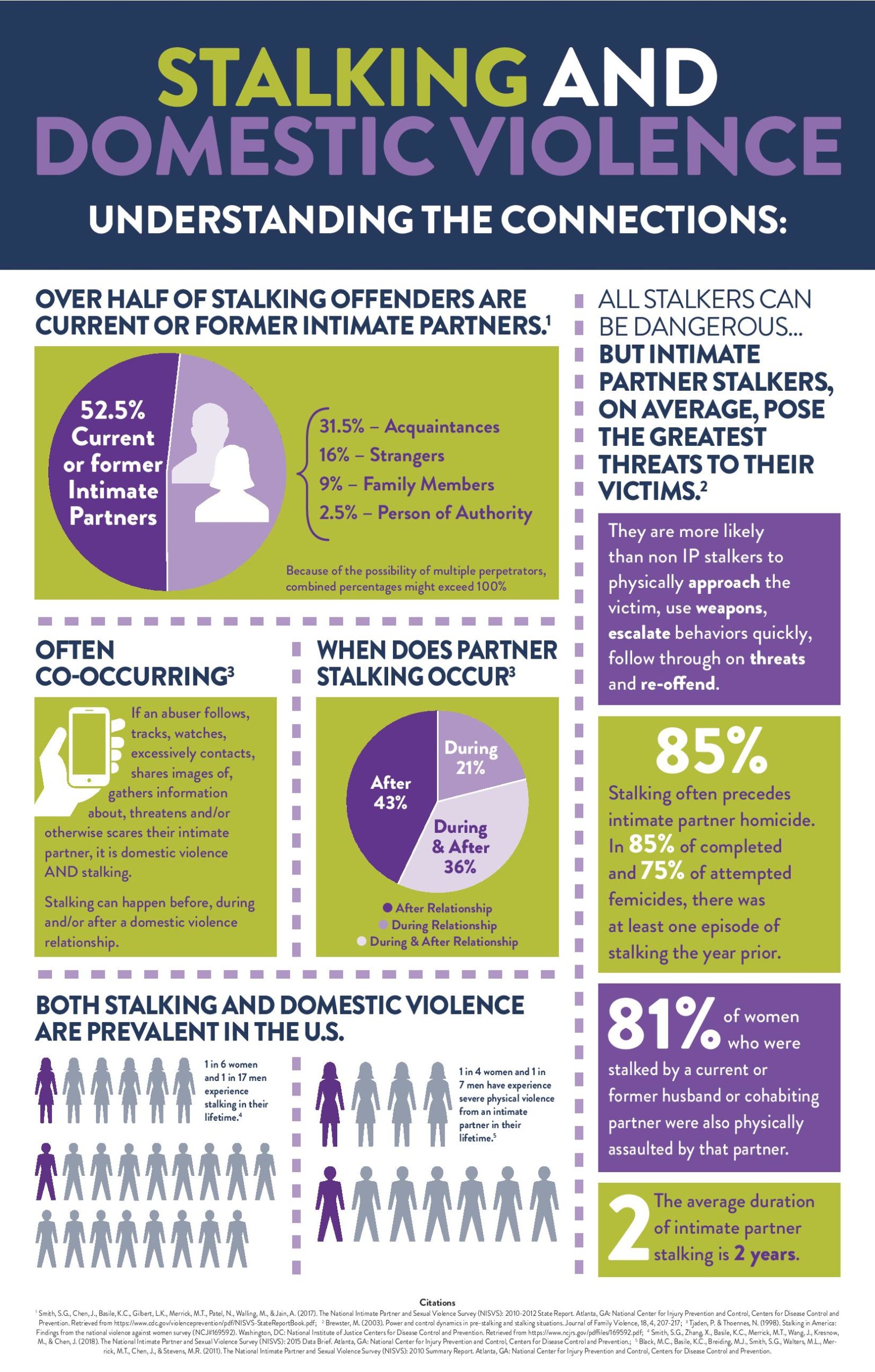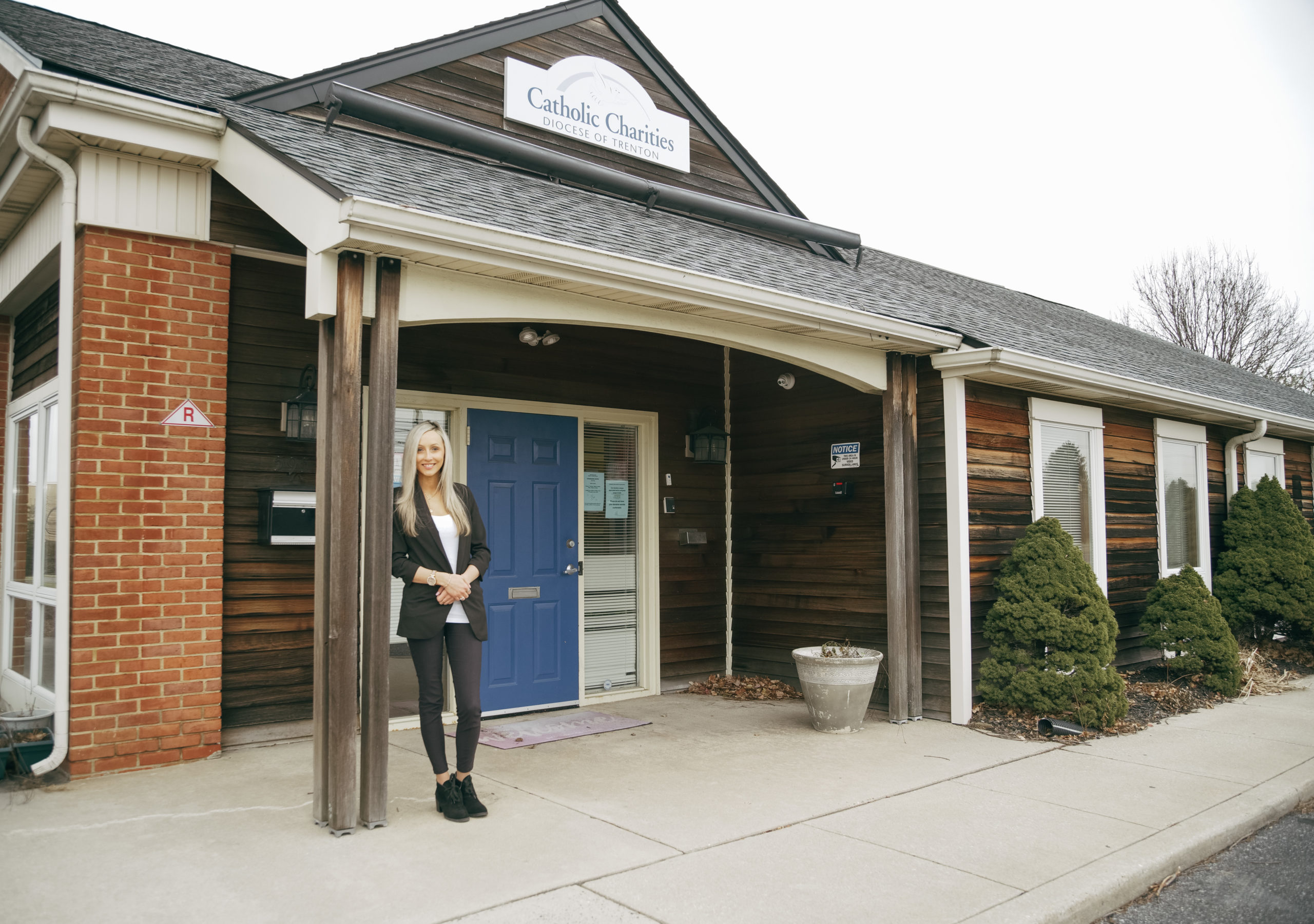Stalking: The minimized crime that can prove deadly
 On the continuum of crime, stalking might strike some as not a big deal. Maybe they think stalkers are creepy men hiding behind a tree – more a bother than a peril, someone to ignore and they will eventually go away.
On the continuum of crime, stalking might strike some as not a big deal. Maybe they think stalkers are creepy men hiding behind a tree – more a bother than a peril, someone to ignore and they will eventually go away.
But that misconception is miles from the truth and dangerously minimizes the menace stalking really represents, according to Sarah Eaise of our Providence House Domestic Violence Services (pictured, left).
January is National Stalking Awareness Month, so we sat down with Sarah, our in-house expert on stalking behaviors, to learn more about this potentially lethal crime – and the ways people can protect themselves.
Stalking, explained
Q: What is stalking?
Sarah: Stalking is a serious crime that can escalate over time. It’s essentially any pattern of behavior that would cause someone to feel fear for their safety. Anybody can be stalked by anyone – a stranger or acquaintance. But stalking is a common behavior in intimate partner violence. In that context, stalking is a tactic abusers use to maintain power and control over their victim.
Q: How exactly do they do that?
Sarah: As technology evolves, we have seen stalking evolve too, with more abusers using technology to stalk. Often what you’ll see abusers do is attach trackers to cars, monitor victims through their phones, and send constant messages to victims through their phones. An intimate partner usually has pretty easy access to someone’s phone, and this kind of stalking typically gets worse after the relationship ended, because the abuser feels like they’re losing their control. But there are also other behaviors that are stalking behaviors – showing up unannounced to victims’ workplaces, sending constant messages through relatives, and sending unwanted gifts.
Q: Those last few sound like something you see in every Hollywood rom-com – like that’s something “romantic” instead of criminal.
Sarah: It’s definitely concerning that some people – and popular culture – can fail to label these behaviors as stalking, and therefore minimize it. A lot of times, stalking can look like behaviors that don’t seem concerning or illegal to an outside party. They might think it’s persistence or even romantic, like ‘they’re just having a hard time with the breakup’ or ‘this shows they really love you.’ But we really need recognize, as a society, that these behaviors are unhealthy. If someone causes a person great emotional distress and fear because they won’t leave them alone, the victim really is losing their freedom to be their true self. When society minimizes that, it really intensifies the victim’s feelings. Minimizing that also doesn’t recognize the lethality of stalking.
A potentially deadly crime
Q: Stalking can be lethal?
Sarah: Yes, within intimate partner violence, stalking is a behavior that can be very dangerous. We know that 76 percent of intimate partner homicide victims had been stalked by the partner who killed them. We also know from studies that abusive partners who stalk are more likely to be physically and sexually violent. So when society minimizes stalking, we fail to address the danger that is involved. And a person who’s being stalked is less likely to reach out for help if we’re not recognizing stalking as the potentially violent or lethal crime that it is.
Q: What about the law? Does the legal system recognize stalking as a potentially violent or lethal crime?
Sarah: The laws vary by state. Sometimes, stalking gets charged as harassment, when really those are two very different things. In New Jersey, stalking is a crime of either the third or fourth degree. It’s also a predicate act of domestic violence for a restraining order, which means the victim has the right to file a restraining order based on behaviors that indicate stalking. But for a victim to involve the court system, that could also lead to an escalation of stalking and other abusive behaviors. So it’s always best for the victim to do what they feel is right for them. If the court does grant a final restraining order, then the defendant is no longer allowed to purchase, own, possess, or control a firearm, a permit to purchase a handgun, or a Firearms Purchaser Identification Card.
Q: Do you see any evidence that stalking affects one particular group over others?
Sarah: Stalking can affect anyone regardless of race, age, socioeconomic class, or gender. We do know that women are affected at a higher rate than men and people between the ages of 18 and 24 have the highest rate of stalking victimization. Studies have also shown that over half of stalking offenders are current or former intimate partners.
Protect yourself
Q: Can you protect yourself from stalking – and how?
Sarah: We do a lot of safety planning. That’s an individualized plan we make (with the victim) to help them in trying to stay safe. We may encourage people to walk to their car with a buddy when leaving work, check the backseats of their car before getting in to make sure no one is there, and get alarms on their doors or windows at home. We pre-plan escape strategies and routes, because our brain doesn’t process things, when we’re in a dangerous situation, the way it usually does. We also help people go through their privacy and location settings on their smartphones and apps to protect themselves from spyware and prevent their abuser from seeing where they are at any given time. We also educate about the red flags of stalking, like if someone always seems to know where you are and you can’t figure out why. And we do emotional safety planning, like suggesting self-care strategies, enlisting more supportive people in their lives, and reaching out to resources that can help. There’s no five-point plan that works for everybody.
Q: That’s a lot! How can loved ones support a person they suspect is experiencing stalking and domestic violence?
Sarah: The most important thing to do as a friend is to listen and support them. Believe them. Stalking and other forms of abuse are never the victim’s fault. The Stalking Resource Center has a lot of useful information for people to educate themselves. I really want to emphasize how important it is to validate the experiences of victims and ensure that they know you are there to support them in their decisions, even if you have a hard time understanding those decisions. You never know when someone will confide in you about abuse, but if we educate ourselves then we can be a part of supporting the voices of survivors.
 Sarah Eaise works for Catholic Charities, Diocese of Trenton’s Providence House Domestic Violence Services in Burlington County as a domestic violence advocate at Superior Court. She accompanies victims to court and supports and educates them beforehand and afterward. She also works as a domestic violence liaison for the New Jersey Department of Child Protection & Permanency. She has worked with Catholic Charities since 2016 and previously worked with domestic violence survivors in Camden County. She graduated Rutgers University with a master’s degree in social work and a certification in violence against women and children.
Sarah Eaise works for Catholic Charities, Diocese of Trenton’s Providence House Domestic Violence Services in Burlington County as a domestic violence advocate at Superior Court. She accompanies victims to court and supports and educates them beforehand and afterward. She also works as a domestic violence liaison for the New Jersey Department of Child Protection & Permanency. She has worked with Catholic Charities since 2016 and previously worked with domestic violence survivors in Camden County. She graduated Rutgers University with a master’s degree in social work and a certification in violence against women and children.
Learn more
Catholic Charities, Diocese of Trenton’s Providence House Domestic Violence Services offers free and confidential domestic violence services and safe shelter in Burlington and Ocean counties. Reach them here.
Read more about stalking from the Stalking Prevention, Awareness, and Resource Center (source of the fact sheet above) here and the National Center for Victims of Crime here.
Subscribe for more news
To subscribe to our blog posts and news releases, fill out the fields below.